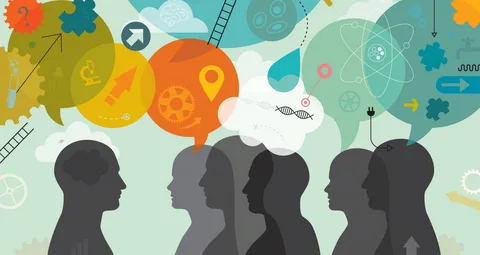Introduction
In today’s fast-paced world, a fulfilling social life is as essential as a successful career. It provides us with the joy of companionship, the comfort of belonging, and the opportunity to grow through diverse interactions. However, enriching one’s social life can sometimes feel like a daunting task. This article aims to shed light on social dynamics and provide actionable insights to help you cultivate a vibrant and rewarding social circle. Whether you are an extrovert seeking to widen your social horizons, or an introvert hoping to foster deeper connections, this guide will offer valuable pointers to enhance your social interactions and experience.

The Fundamentals of Social Dynamics
Social dynamics, in essence, refers to the study of human interactions that take place within and between social groups. It examines how these interactions influence our behavior, decisions, relationships, and overall social structure.
Explanation of Social Structures and Interactions
Social structures can be seen as an interconnected network of individuals and the relationship ties they form, such as family, friends, or work colleagues. These structures, though seemingly static, are continuously influenced and reshaped by the interactions within them. Such interactions can be as trivial as everyday conversation or more significant ones like group decision-making or conflict resolution.
Individuals Contributing to Social Dynamics
Every individual plays a unique role in shaping social dynamics. Our behaviors, beliefs, attitudes, and personal experiences influence how we interact with others. These interactions, in turn, contribute to the ever-evolving social dynamics around us. Whether it’s through active participation or passive observance, individuals shape and are shaped by the social structures they belong to.
Key Entities in Social Dynamics
In the sphere of social dynamics, two primary entities play crucial roles – individuals and groups or communities.
Individuals
Individuals are the fundamental building blocks of any social structure. Each person brings a unique set of traits, experiences, and perspectives to the table, influencing the dynamics of their social interactions. Every decision, action, or reaction of an individual can instigate change in the social dynamics, making them a critical player in the way social structures evolve.
Groups and Communities
Groups and communities, on the other hand, represent the collective entity in social dynamics. They can be as small as a family unit or as large as a national community. These entities exert a collective influence on the social dynamics, creating norms, values, and social cues that guide individual behavior. The interaction within and among these groups and communities catalyzes social change, shaping societal norms, customs, and behaviors.
Relationships and Interactions
Interpersonal Relationships
Interpersonal relationships play a pivotal role in social dynamics, shaping the way individuals interact, behave, and perceive their social environment. These relationships can be broadly categorized into friendships, romantic connections, and family dynamics. Each type of relationship has its nuances and complexities that contribute to the dynamic nature of social interactions.
Friendships
Friendships are voluntary interpersonal relationships between individuals, often characterized by mutual affection, understanding, trust, and respect. These relationships significantly influence our social behavior, emotional well-being, and personal development.
Romantic Connections
Romantic connections introduce an additional layer of complexity to social dynamics. These relationships, characterized by intense emotional attachment and intimacy, influence our behavior, decision-making, and interaction with the wider social environment.
Family Dynamics
Family dynamics are perhaps the most complex facet of interpersonal relationships. The roles and interactions within a family shape our behavior, values, beliefs, and understanding of social norms and relationships.
Communication Styles and Emotional Intelligence
Communication styles and emotional intelligence are key factors that influence our interpersonal relationships and social interactions. Different communication styles can lead to different interpretations, responses, and outcomes in social situations. At the same time, emotional intelligence, the ability to understand and manage emotions in ourselves and others, is crucial in navigating our social world, forging strong relationships, and effectively managing conflicts.
Social Influence
Social influence is a significant factor in how we shape and are shaped by our social environment. It refers to how individuals change their behavior to meet the demands of a social environment. It can take many forms, including conformity, socialization, peer pressure, obedience, leadership, persuasion, sales, and marketing.
Peer Pressure and Social Conformity
Peer pressure and social conformity are forms of social influence where individuals modify their attitudes or behaviors to align with the perceived norms of a group. While these forces can have positive effects, encouraging people to adopt healthy habits or work towards common goals, they can also lead to negative outcomes such as risky behavior or loss of individuality.
Positive and Negative Impact of Social Influence
Social influence can have both positive and negative impacts on individuals and society. On the positive side, it can encourage cooperation, promote social norms, and foster social cohesion. On the negative side, it can lead to conformity, loss of individuality, and the propagation of harmful or undesirable behaviors. Understanding the mechanisms of social influence and their impact is crucial in promoting positive social dynamics and mitigating negative outcomes.
Enhancing Social Skills
Social skills are essential for navigating the complexities of interpersonal relationships and social structures. They are the tools that enable us to interact effectively with others and contribute positively to our social environment.

Developing Empathy
Empathy, the ability to understand and share the feelings of others, is a critical social skill. It fosters mutual respect and understanding, promotes open and honest communication, and helps to forge strong, healthy relationships. Developing empathy involves active listening, showing genuine interest in others’ experiences, and practicing compassion. By putting ourselves in others’ shoes, we can better respond to their emotions and needs, fostering a more inclusive and supportive social environment.
Effective Communication
Effective communication is fundamental to the successful exchange of ideas and feelings. It involves not only speaking clearly and confidently but also listening attentively and responding thoughtfully. Effective communicators can express their thoughts and needs assertively without undermining their rights or disregarding the feelings of others. They can interpret verbal and non-verbal cues, manage conflicts constructively, and maintain a positive, open dialogue.
FAQs
How can understanding social dynamics help improve my social life?
Understanding social dynamics can provide insights into how individuals, groups, and social norms interact and influence each other. By being aware of these dynamics, you can better navigate social situations, manage relationships, and adapt your behavior to different social contexts, thereby enhancing your social life.
What role does empathy play in enriching our social life?
Empathy, the ability to share and understand others’ feelings, is a cornerstone of healthy relationships. It promotes mutual respect, understanding, and open communication, fostering strong, enriching interpersonal connections.
How can effective communication improve my social life?
Effective communication is key to expressing our thoughts, needs, and emotions clearly, while also understanding those of others. By communicating effectively, we can avoid misunderstandings, manage conflicts constructively, and foster positive relationships, thereby enhancing our social life.
Conclusion
The intricate web of social dynamics is integral to enriching our social lives. From friendships and romantic connections to family dynamics and communication styles, each facet of our social interactions shapes our behavior, beliefs, and emotional well-being. The profound impact of social influence, both positive and negative, underscores the importance of navigating these dynamics with awareness. Enhancing social skills, developing empathy, and effective communication are crucial in fostering healthy relationships and a fulfilling social life. As we continue to navigate our social environments, let’s remember that the journey of understanding social dynamics is an ongoing one, filled with opportunities for growth, learning, and connection.




